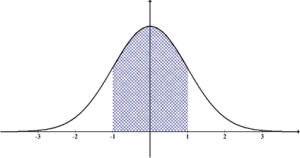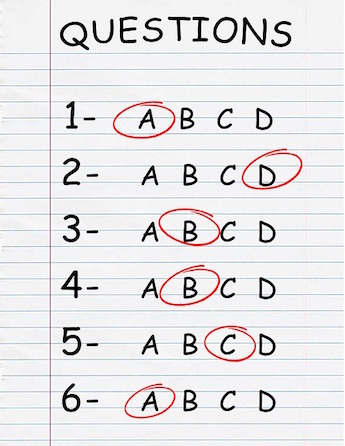
Not sure what your GRE score means? You’re not alone — the GRE score range is one of the least intuitive scoring scales out there. It can be hard to tell whether a 150 (or a 165 or a 138) is a high score or a low one. Luckily, we’re here to help!
In this article we’ll go over the GRE score scale for each of the three sections (Verbal Reasoning, Quantitative Reasoning, and Analytical Writing), discuss the general score distribution for the GRE, talk about some program-specific score distributions and averages, and finally turn to how this affects you. What score should be aiming for and how should you set a score goal based on the programs you are interested in?
GRE Score Range
The GRE has three sections: Verbal Reasoning, Quantitative Reasoning, and Analytical Writing. Verbal Reasoning and Quantitative Reasoning are both multiple choice and are both scored from 130-170 in one-point increments. This means that there are 41 possible scores. So, the GRE score range is 130-170 for the main sections of Verbal Reasoning and Quantitative Reasoning. 130 is the lowest possible score, and 170 is the highest.
However, Analytical Writing, the essay section, is scored from 0-6 in half-point increments. So there are 13 possible scores on that section, and the score range is 0-6.
So why 130-170? It’s kind of a bizarre scale, to be sure. While I can’t necessarily tell you why they chose those specific numbers, I can provide some insight into the situation.
Before August 2011, Verbal and Quant were both scored from 200-800 points in 10-point increments, like the SAT. (If you took the old GRE, you can see our old GRE to new GRE conversion chart here.) In making the new score scale from 130-170, ETS accomplished a couple of things:
- They kept the scoring scale in three digits. This helped graduate schools with computer systems already keyed to accept three-digit scores.
- They ensured that there was no overlap between the two scales (i.e. they did not include any of the same numbers). This meant there could be no confusion as to whether a score was in the old or new scale.
- They limited the chance of schools overestimating the difference between candidates who actually had very close scores by making 1-point increments in scores. A 152 and a 154 sounds much closer than a 520 and a 540.
That’s the general motivation behind the 130-170 GRE scoring scales. But what do the different scores in that range actually mean?
Quick side note: we've created the world's leading online GRE prep program that adapts to you and your strengths and weaknesses. Not sure what to study? Confused by how to improve your score? We give you minute by minute guide.
You don't NEED a prep program to get a great GRE score. But we believe PrepScholar is the best GRE prep program available right now, especially if you find it hard to organize your study schedule and don't know what to study.
Click here to learn how you can improve your GRE score by 7 points, guaranteed.

GRE Score Distribution
When the GRE was redesigned, one goal was to “normalize” the score distribution—to create a scoring bell curve with most students scoring around the middle of the scale (so, at 150). Then, moving outward from the center, fewer students would score around the extreme ends of the scale.

ETS was mostly successful in their endeavor to center the GRE score scale at 150. Based on data from test-takers from July 2013-June 2016, the average GRE score on the verbal section is 150, and the average quantitative score is 153.
Here’s a general chart of how scoring shakes out in terms of GRE score percentiles. A percentile is the percent of test-takers that scored below the given score, so higher your percentile score, the better you did.
GRE Score Percentiles
| Score (130-170) | Verbal Percentile | Quantitative Percentile |
| 140 | 12 | 8 |
| 145 | 27 | 20 |
| 150 | 48 | 38 |
| 155 | 69 | 59 |
| 160 | 86 | 76 |
| 165 | 96 | 89 |
| 170 | 99 | 97 |
For Analytical Writing, the average score is 3.5. Here’s the percentile distribution among scores for Analytical Writing:
Analytical Writing Score Percentiles
| Score | Percentile |
| 1.5 | 1 |
| 2.0 | 2 |
| 2.5 | 8 |
| 3.0 | 18 |
| 3.5 | 42 |
| 4.0 | 60 |
| 4.5 | 82 |
| 5.0 | 93 |
| 5.5 | 98 |
| 6.0 | 99 |
Source: ETS GRE score guide
So how many students score at the extreme ends of the scale? We can figure this out based on the GRE percentile chart.
On Verbal, one percent of students score from 130-132, and one percent score from 169-170. Between July 2013 and June 2016, over 1.7 million students took the test. So about 17,000 students in that time scored between 169-170 on Verbal and another 17,000 scored from 130-133. This means that fewer than 17,000 students actually scored at each of the most extreme ends of the scale, 130 and 170.
On Quant, one percent of students score from 130-134, and three percent score 170. So between July 2013 and June 2016, about 17,000 students scored between 130-134, and about 51,000 scored a 170.
On Analytical Writing, one percent of students (about 17,000 from July 2013-June 2016) scored a 6.0.
ETS also provides discipline-specific data on how many students score at the extreme ends of the scale. This data is based on students’ self-reported areas of prospective graduate study.
In all disciplines the number of students scoring at extreme ends of the scale is very low. On the Verbal section, 0.2-2.1% of test-takers in each discipline received perfect 170 scores. On Quant, the numbers of perfect 170 scores range from .4% to a whopping 9.0% in the physical sciences. On the low end, no discipline had more than 4.7% of test-takers score in the 130-134 range for Verbal, and no more than 1.5% for Quant. And again, this is all scores from 130-134, not just the 130 scores at the very bottom of the scale.
In sum, scores at the very low end and the very high end of the scale are generally rare, though there is some variation between disciplines.

Program-Specific GRE Score Distribution
The score percentile tables in the previous section apply to test-takers going into all programs and disciplines. But, as mentioned previously, students intending on going into different graduate courses of study have different score distributions.
Below is a chart with the average GRE scores for test-takers going into specific disciplines. This will give you an idea of how other people intending on pursuing similar graduate programs are scoring.
Average GRE Scores by Intended Discipline
| Discipline | Average Score Verbal | Average Score Quant | Average Score Writing |
| Life Sciences | 151 | 151 | 3.8 |
| Physical Sciences | 150 | 158 | 3.4 |
| Engineering | 149 | 159 | 3.3 |
| Social Sciences | 153 | 151 | 3.9 |
| Arts and Humanities | 156 | 150 | 4.1 |
Data from Percentage Distribution of Scores Within Broad Graduate Major Field (ETS).
As you would expect, those intending to pursue studies in the humanities and social sciences scored higher than the overall average on Verbal. Similarly, those pursuing scientific or engineering study scored higher than average on Quant. Prospective engineers scored the lowest on Analytical Writing. Prospective Arts and Humanities students scored the highest.
So now you can see the average for your chosen discipline. But what does this mean for you? Is it enough to just beat the average in your discipline? What score should you be aiming for?

What GRE Scores Should You Aim For?
At the most basic level, you should be aiming for the highest score you can achieve. (Kind of a no-brainer.) On a more practical and useful level, though, you’ll want to set a goal score. If you meet (or exceed) your goal score threshold, you don’t need to take the test again.
People often talk about “good GRE scores” as though that’s something that is absolute across disciplines. To some extent it is—a 170 is always going to be good in any discipline, for example. But to a large extent, a “good” score on the GRE is discipline-specific and even program-specific.
For example, a 160 on Quant would be a stellar score on that section if you want to get a Masters in Art History, but it’s not particularly impressive if you’re trying to get a PhD in Physics. Of course, your Quant score probably also matters a lot less to the Art History department than your Verbal score. Similarly, a 155 might be a good score on Verbal at a mid-ranked Art History program, but a top program may well expect a 165+.
Your goal score should be one that gives you a good chance of getting accepted to all the graduate programs you are interested in. (Based on your test scores, at least—there are graduate programs for which the GRE is comparatively less important or even unimportant, and in general even a stellar score won’t do much to get you in if you don’t meet the program’s other requirements.)
So how do you set a goal score? Read on!

How to Set a GRE Goal Score
You’ll set a goal score based on the programs you are interested in. Unfortunately, this is much harder for graduate school than it is for undergraduate applications, simply because there is often less information available from the program about what scores they are looking for.
Most undergraduate institutions provide a statistic called the middle 50%, which gives the SAT and/or ACT scores of the middle 50% of admitted students. (So, the 25th and 75th percentile of admitted students.) For many graduate schools, you’ll be lucky if the program reports even an average score for admitted students.
With that in mind, here’s a three-step process to setting a goal score.
Want to improve your GRE score by 7 points? We have the industry's leading GRE prep program. Built by world-class instructors with 99th percentile GRE scores, the program learns your strengths and weaknesses through machine learning data science, then customizes your prep program to you so you get the most effective prep possible.
Try our 5-day full access trial for free:
Step 1: Find Information
If there is information to be found, it can usually be found either on the “application requirements” page for that school or on the “frequently asked questions” about admission and applications. You can also find any available info by Googling “[name of school] [name of program] GRE scores.”
The kind of information you’ll get from this method varies. Some schools will tell you the average GRE score of those accepted. For example, for the LSU Master’s in Analytics, they report that “the average GRE and GMAT scores accepted are around 315 and 640 respectively.” That would be 315 for Verbal and Quantitative together, or about 157-158 on each section.
Other programs will tell you GRE percentiles, like the Harvard Graduate School of Engineering and Applied Sciences. They report of their entering class from 2016, “average GRE quantitative scores were within the 90-95th percentiles, and average GRE verbal scores were within the 80-85th percentiles.” Cross-referencing that with the GRE percentiles, that would be scores of about 165-169 on Quant and 158-160 on Verbal.
Still other schools give even more general advice, like the University of Chicago Harris School of Public Policy, which reports that “We do not have a minimum GRE score requirement. Admitted student scores are generally in the 75th percentile or higher.” That would be at least 157 for Verbal and 160 for Quant.
Note that you might occasionally find a graduate program that still lists GRE information for the old GRE, which was scored from 200-800. In this case, consider a different graduate school. Just kidding! You can cross-reference old scores to the current ones with a concordance table.
If you can’t find any information on GRE scores on school websites, don’t panic! Skip the next two steps and move on to the section below, “What if none of my programs give GRE information?”

Step 2: Assemble Information
So how do we assemble all the different kinds of information we get from these programs into a goal score? What you need to do is keep a chart of all the information you can find on GRE scores from the programs you are interested in.
Let’s go through an example. Say that Arno wants to get a Master’s in Public Health. Arno is interested in the University of Illinois at Chicago, University of Michigan, Boston University, and Emory University.
Here’s Arno’s table before he fills anything out:
| School | What They Say | Verbal Score | Quant Score |
| UIC | |||
| University of Michigan | |||
| Boston University | |||
| Emory |
Now he needs to look up any GRE information he can find on these schools’ websites.
First we’ll check UIC. On their website they say, “The MPH program is highly competitive, so successful applicants typically have scores of at least 150 on each the Verbal and Quantitative sections of the test.”
Let’s note that down in Arno’s chart.
| School | What They Say | Verbal Score | Quant Score |
| UIC | At least 150 on each section | 150+ | 150+ |
| University of Michigan | |||
| Boston University | |||
| Emory |
Moving down the list, let’s check out the University of Michigan. They don’t have the information we are looking for in their FAQs, but they do have “Class Cohort Figures,” which tells us the average GRE score for previous cohorts of the program. The 2015 cohort, the most recent one listed, had a Median Verbal Percentile of 81.5% on the GRE and GMAT, and a Median Quantitative Percentile of 73.5%.
Checking our ETS percentile chart, this corresponds to a Verbal score of about 159 and a Quant score of about 159. Let’s note that down.
| School | What They Say | Verbal Score | Quant Score |
| UIC | At least 150 on each section | 150+ | 150+ |
| University of Michigan | 81.5 percentile verbal and 73.5 percentile quant | 159 | 159 |
| Boston University | |||
| Emory |
Next we’ll look at Boston University. In their Admissions FAQs, they say, “the most competitive applicants typically report GRE scores at the 50th percentile or above for each section.”
Checking our percentile chart, that would correspond to a Verbal score of 151 and a Quant score of 153. Let’s mark it down.
| School | What They Say | Verbal Score | Quant Score |
| UIC | At least 150 on each section | 150+ | 150+ |
| University of Michigan | 81.5 percentile verbal and 73.5 percentile quant | 159 | 159 |
| Boston University | 50th percentile or above | 151 | 153 |
| Emory |
The last school on our list is Emory. An infographic on their admissions page states that average Verbal and Quant scores are both 158 and 159, respectively.
| School | What They Say | Verbal Score | Quant Score |
| UIC | At least 150 on each section | 150+ | 150+ |
| University of Michigan | 81.5 percentile verbal and 73.5 percentile quant median scores | 159 | 159 |
| Boston University | 50th percentile or above | 151 | 153 |
| Emory | Average 158 Verbal and 159 Quant | 158 | 159 |
We have our filled-out chart for Arno now. What’s next?

Step 3: Set a Goal Score
Once you have a filled-out chart, scan it for the highest score in each column.
In the case of Arno, that would be 159 on both Verbal and Quant. A 159 on each section would have Arno positioned pretty well for all of his schools. Of course, if he wants to be even more competitive, he could aim even higher—say, a 161 on each section. This would make him competitive even at his most selective school, University of Michigan. But if he hits that 159 on each section he could stop testing and focus on other parts of his application and still feel confident in his shot at most of his schools.
Here’s a blank chart for you to print out and use (click image for PDF):
That’s the breakdown on how to set a goal score if there is information available online about GRE scores of successful applicants and/or current students. But what if there’s no info to be found?

What If None of My Programs Give GRE Information?
Some programs do not give any kind of GRE score information for prospective applicants. They may even affirmatively state that they don’t publish the information.
In this situation, you first need to consider: Do my scores actually matter that much? If you think, yes, they do matter, you can use ETS data to get an idea of what a good GRE score is to be a competitive applicant.
First: Do My Scores Actually Matter That Much?
Programs won’t request GRE scores if they truly don’t matter at all. However, some programs, like writing MFA programs, only request GRE scores so that you can be admitted to the graduate school overall, while they make the actual admissions decisions based on your writing sample. Essentially, your GRE scores just need to show you have a basic level of competence at dealing with high-level academic work. In this case, you shouldn’t stress about your scores too much, but focus more on the part of your application most relevant to admissions. If you’re concerned, you can call or e-mail the overall graduate school admissions office to discuss minimum score expectations. You can also talk to the specific department/program you are interested in.
Want to improve your GRE score by 7+ points?
Check out our best-in-class online GRE prep program. We guarantee your money back if you don't improve your GRE score by 7 points or more.
PrepScholar GRE is entirely online, and it customizes your prep program to your strengths and weaknesses. We also feature 2,000 practice questions, official practice tests, 150 hours of interactive lessons, and 1-on-1 scoring and feedback on your AWA essays.
Check out our 5-day free trial now:
PhDs are another area where GRE scores are a smaller part of your overall application. However, this isn’t because PhD programs don’t care about your GRE scores. This is because they also care about a lot of other things: your publication history, research history, work experience, teaching experience, and so on. Furthermore, because PhDs are often very competitive, a good GRE score can be essential to setting you apart from other applicants. Of course, the score on the relevant section is the most important part. When applying for a PhD in Comparative Literature, for example, it probably won’t be a huge deal if your Quant score is 145. But they will expect a high score in the relevant section for you to be a competitive applicant.
PhD programs also often request GRE Subject Tests to further test your mastery in the relevant subject area. The UCLA Department of Mathematics, for example, reports that “On the average, those we offer admission to have GRE subject scores in or above the 80th percentile.” In this case, you also need to focus on getting a high score on your GRE subject test in math. Of course, if you can get an 80th percentile score on the Math subject test, you’ll doubtless do well on the Quant section of the GRE anyways!

How Do I Get More Guidance?
If you feel your scores are important, or you aren’t sure, or you just want more guidance, I strongly advise you to call the admissions offices of the programs you are interested in. They may be able to provide more concrete knowledge about what GRE scores you should be aiming for.
You can also check out Grad Cafe’s grad school discussion forums or a Reddit page for your program of interest and/or area of study.
Another thing you can do to get an idea of what scores might make you a competitive applicant is to look at ETS data for prospective graduate students in your area. The linked document includes average Verbal, Quant, and Analytical Writing scores for test-takers who stated they were interested in pursuing specific fields.
Let’s say Ginevra is applying to journalism programs, but none of her top-choice programs give GRE scores. If she looks at the ETS data for students who say they are going into journalism, she can see that mean Verbal scores are 152 and mean Quant scores are 150.
Of course, these are the mean scores of potential applicants, not the mean scores of admitted students. So if you want to be truly competitive, aim to score at least five points higher than this mean—so, a 157 on Verbal and a 155 on Quant. This will make you competitive as compared to the general mass of other students applying to similar programs. It’s important to note that this will really only make you competitive at mid-range schools and lower. If you’re going for competitive programs, you need a top score in the relevant section(s) no matter what because they want the absolute top students.

Key Takeaways for the GRE Score Range
The GRE score range is 130-170, scored in one-point increments, for the Verbal and Quantitative Reasoning sections. On the Analytical Writing section, the scoring range is 0-6 in half-point increments.
The Verbal and Quantitative sections are meant to have an approximately normal distribution centered around 150. The average verbal score is 150 and the average quantitative score is 153.
As you might expect, average scores on Quant are higher among students going into math and sciences, and average scores on Verbal are higher among students going into the humanities.
In setting a GRE goal score, you want to set a goal that will give you a competitive chance of getting in to all the programs you are applying to.
To set a goal score:
- Look up any information on GRE scores of successful applicants you can find on the admissions websites of programs you are interested in.
- Record that info in a chart.
- The highest scores on each section should be your goal score!
If none of your programs provide GRE score information:
- Consider if your GRE test scores are particularly important to admission. If you aren’t sure, call the admissions office.
- You can also get an idea of what score would make you a competitive applicant by looking at ETS data on the mean scores of prospective students in different disciplines.
Now you understand GRE scores, and you’re ready to set some GRE score goals!
What’s Next?
Need more information on what makes a good GRE score? We can explain GRE score percentiles in-depth.
Check out our articles on the lowest possible GRE score and the highest possible GRE score.
Looking for an overview of all GRE sections? How about some some essential tips and tricks for test day?
Ready to improve your GRE score by 7 points?
We've written a eBook about the top 5 strategies you must be using to have a shot at improving your GRE score.
Download it for free now:



Comments are closed.